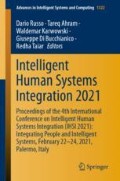Abstract
During the time of the Covid 19 pandemic, the behavior of three human groups was analyzed after having completed the 16-week academic semester in September 2020. The students of each human were divided into 4 resulting quadrants, the attitudinal behavior was weighted on the axis of the abscissa and the axis of the ordinates to the final grade. The students of each one of the groups were distributed applying their percentage value within each one of the quadrants, those that are denominated talented, responsible, confident, disinterested, being their averages 18.27%, 37.69%, 13.09% and 30.99% respectively. It was demonstrated that there is no significant difference between the three groups, in terms of the percentage values assigned to each of the quadrants, as well as that there is no significant difference between the percentage values between the quadrants of the talented and the confident, nor between the responsible and the disinterested.
Access this chapter
Tax calculation will be finalised at checkout
Purchases are for personal use only
References
IESALC: COVID-19 and higher education: Today and tomorrow. Impact analysis, policy responses and recommendations. UNESCO (2020)
Universidad Nacional de Frontera. http://www.unf.edu.pe/unf/
Jaico, J., Lalupú, J., García, R., Reyes, N.: Maturity model for digital teacher transformation based on digital and organizational competencies in higher education. In: CEUR Workshop Proceedings, vol. 2555, pp. 103–112 (2019)
Kuehl, R.: Diseño de experimentos, Principios estadísticos de diseño y análisis de investigación. Thomson Learning, México (2001)
Author information
Authors and Affiliations
Corresponding author
Editor information
Editors and Affiliations
Rights and permissions
Copyright information
© 2021 The Author(s), under exclusive license to Springer Nature Switzerland AG
About this paper
Cite this paper
Hernández, E., Sócola, Z., Choque, T., Ygnacio, A., Hernández, W. (2021). Frequency Weighting of Student Categories in Quadrants for Remote Higher Education Under COVID 19 Pandemic Era. In: Russo, D., Ahram, T., Karwowski, W., Di Bucchianico, G., Taiar, R. (eds) Intelligent Human Systems Integration 2021. IHSI 2021. Advances in Intelligent Systems and Computing, vol 1322. Springer, Cham. https://doi.org/10.1007/978-3-030-68017-6_45
Download citation
DOI: https://doi.org/10.1007/978-3-030-68017-6_45
Published:
Publisher Name: Springer, Cham
Print ISBN: 978-3-030-68016-9
Online ISBN: 978-3-030-68017-6
eBook Packages: Intelligent Technologies and RoboticsIntelligent Technologies and Robotics (R0)

